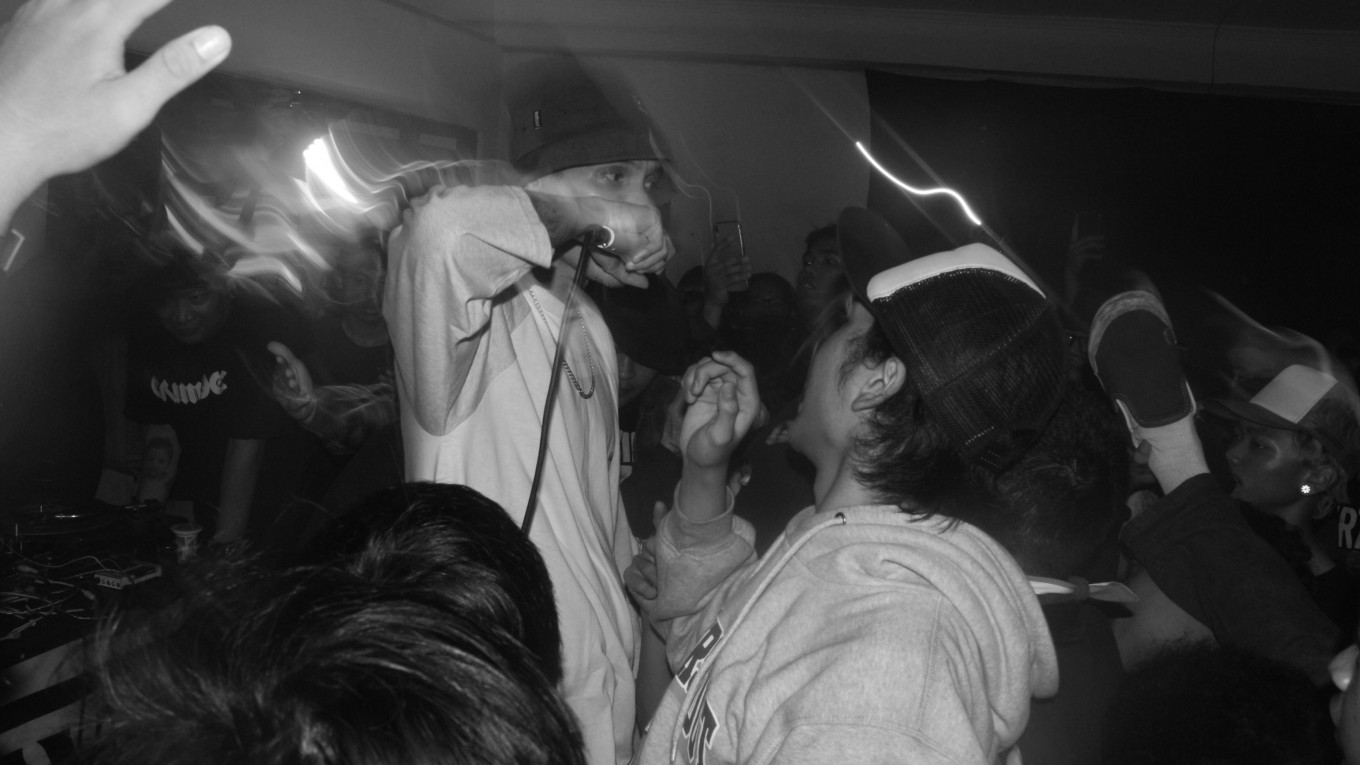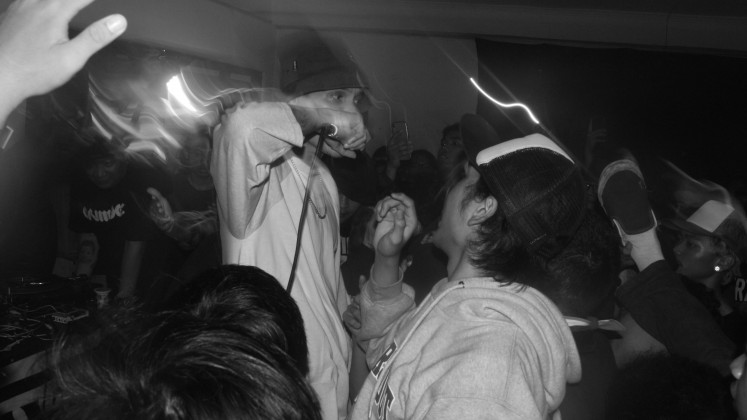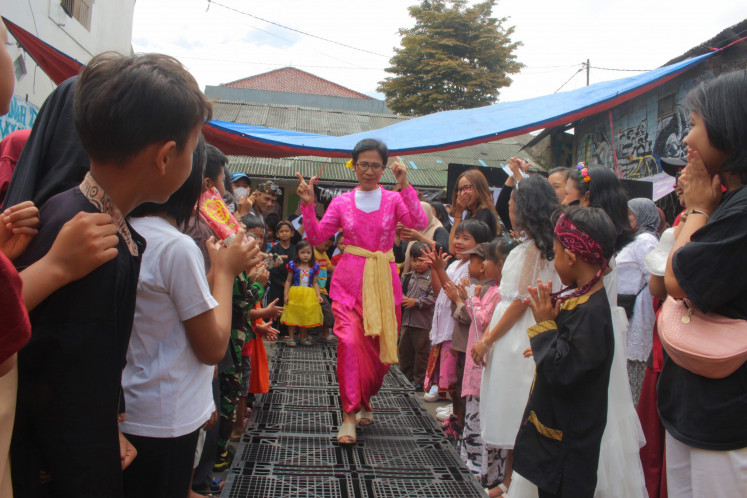How activists and artists fight to keep Dago Elos for its villagers
Activists and creative types fought against the land clearing of kampung Dago Elos. Holding activism seminars, concerts, and more to show the urban village’s significance as a cultural hub.
Change text size
Gift Premium Articles
to Anyone

A
ctivists and creative types fight against the land clearing of kampung Dago Elos. Holding activism seminars, concerts and more to show the urban village’s significance as a cultural hub.
Dago Elos, an urban village in Bandung, has become quite the epicenter of a heated debacle. Since residents were charged with illegally squatting on lands claimed to be owned by a family of Dutch descent in December 2016, the narrative of its importance as a cultural space has grown significantly.
Activists and creative types, including musicians, artists, literati and the sort, have taken to adopting the area as a cultural space where they hold exhibitions, concerts, discussions and traditional events. They have done this in major part, to show how the area should remain for its residents and not be cleared by developer PT Dago Inti Graha, following the March 29 decision favoring the side claiming to rightly own the land.
Fighting a losing battle
Three hundred and thirty-one households residing in Dago Elos were brought to court by siblings Heri Hermawan Muller, Dodi Rustendi Muller and Pipin Sandepi Muller on the basis of Eigendom Verponding certificates (a product of land law during the Dutch occupation in Indonesia) owned by their forefather, George Hendrik Muller.
The charges were filed by Dago Inti Graha, a company founded on July 29, 2016 that acquired the rights to the plots of land on Aug. 1, 2016.
Since then, these households have been fighting arduous battles in courts. They lost in the district court and local court and their appeal was rejected in the high court and provincial court.
The residents saw a glimpse of light after the Supreme Court granted their cessation appeal on Oct. 10, 2019, however, the top court then granted the charges of the Muller siblings and Dago Inti Graha on the case review level on March 29, making the highest, most absolute decision in Indonesia.
Upon the disclosure of the court results stating their imminent eviction, the residents of Dago Elos decided to stand their ground for the land they considered their birthright.
“In relation to Elos, the judicial process, correlating with a healthy legal culture, should highlight legal awareness more than a sense of justice,” Alvin Wijaya Kesuma, Muller family and Dago Inti Graha attorney and legal representative, texted through WhatsApp on Oct. 31 after the The Jakarta Post tried to reach him by phone.
Alvin also noted that “based on the law, there should be no destructive action either in the trial or after the issuance of legal products in the form of decisions that are motivated by distrust of the institution, because a bad internal legal culture will have an impact on external legal culture.”
Does it mean that the residents of Dago Elos are expected to uphold the rule of law above all else and avoid destructive actions that could lead to an unfavorable situation?
Kesuma answered: “Yes, based on legal awareness and law enforcement.”

Resistance through culture
“Sabubukna [until we turn to dust],” wrote the residents on a cloth banner hung in front of their community hall during a press conference held on June 14.
The residents, with the help of some friends, started organizing more events to raise awareness. From children, accompanied by adults, carrying cardboard plastered with messages against eviction standing on the roadside around Dago Terminal, to carnivals with Sisingaan or Singa Depok performances, Sundanese performance art involving palanquins that resemble lions, held in the open space in front of their community hall.
The community’s efforts have created space for concerned outsiders to join in through aligning interests. Particularly drawing crowds from art communities who suffer from a lack of cultural space in Bandung.
Bandung experimental dub band Rub of Rub, was one of the first groups who broke ground in reinventing Dago Elos as a cultural space, attracting attention from outsiders and effectively communicating what the residents of Dago Elos are facing.
“We wanted the issue to reach a wider audience, so that people do not stay silent when it happens again somewhere else,” Rizwan Sukarna from Rub of Rub commented on the eviction faced by the residents. “From my point of view, Rub of Rub and the locals [in Dago Elos] share the same spirit.”
Rub of Rub's performance could seem like the turning point as it was followed by Balinese collective Chaos Non Musica's Muatan Lokal #17 showcase on Aug. 13, Dago Elos' Singa Depok Gentra Siliwangi collaborative performance on Aug. 14, a discussion held by the Agrarian Research Center and Bandung Legal Aid, along with human rights defender PBHI Jabar on Aug. 15, Bandung hip-hop label/collective Def Bloc's Cultz Chamber Vol. 5 on Aug. 16 and a dangdut and organ tunggal (a top 40-cover singer accompanied by a keyboardist) show to close on Aug. 17.
The current pattern of activism, although now more solid, has been part of the village’s movement since 2017 and gained traction with the public through Festival Kampung Kota (Urban Village Festival) held at the end of 2017 in Dago Elos. The festival hosted music concerts, workshops, exhibitions, book markets and film screenings as its main events spread across the course of one month. The second festival took place in RW11 Tamansari, an urban village in Bandung that is now evicted for the construction of a housing development by the city government.
The festivals were in part influenced by Kulon Progo Coastal Farmer's Association's 11th anniversary in Kulon Progo, Yogyakarta, which inspired hip-hop artist Herry Sutresna — also involved in the movement in Dago Elos — to create his own melting pot of agrarian activists, artists and musicians in Bandung.

Desegregation of living and cultural space
When asked about the prevalence of the music scene in their activism, Sutresna noted that “The [music] scene is not sterile. The guys [in the movement] are basically [all] in the music scene, and many of our friends live in [Dago Elos]. There's no place in Bandung that lacks people from the music scene.
“Popular culture such as hardcore punk and metal are considered culture in Bandung. [...] our urban culture is to play in a band,” Sutresna continued.
“It might strike people outside of Bandung as odd, as usually their music scene, their cultural space, is pretty segregated from their living space. In Bandung, it is common to rehearse and perform in our respective kampung. For me, that is how it's supposed to be. Culture cannot be isolated from our living space; it is an integral part of it.”
Popular culture in Bandung seems to have grown into an integral part of all lines of life, not only in culture but also economics and even politics.
“We're not only talking about land. This has a much greater impact, namely on our living space… we are also talking about social areas, social spaces that have been built over a long period of time, and also from an economic perspective because there are many people here that rely on their immediate surroundings,” said Angga Sulistia Putra, Dago Elos resident and the head of Forum Dago Melawan.
Dago Elos ultimately gave birth to a new kind of cultural space laden with amalgams of the modern and the traditional.
“The younger generation's culture, which has been dominated by clubs, bars and all those sorts of things, can be changed,” said Sutresna.
“It could be a culture of the townspeople, not only dominated by the middle class, because, after all, people don't just come from the upper and middle classes, they come from kampung kota [city villages, usually hidden in alleys] as well.”
Albeit temporary in the case of Dago Elos, it would be interesting if the collaborative pattern was adopted in other kampung in Bandung. Giving rise to culture not bound by classism, where mutual relationships between outsiders and residents are fostered by communication and, mostly, the basic values of humanity.









